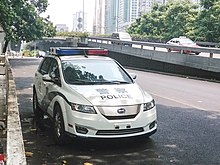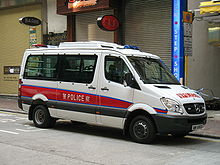Law enforcement in China
 |
|---|
|
|

Law enforcement in China consists of an extensive public security system and a variety of enforcement procedures used to maintain order in the country. Along with the courts and procuratorates, the country's judicial and public security agencies include the Ministry of Public Security (MPS) and the Ministry of State Security (MSS), with their descending hierarchy of departments, bureaus (局, "Jú"), subbureaus (副局, "Fù jú"), and stations (所, "Suǒ").
Hong Kong and Macau have separate law enforcement agencies, different legal systems and are classified as separate jurisdictions under the one country two systems framework. However, the Hong Kong Police Force (HKPF) and Public Security Police Force often cooperate with the mainland MPS on cases involving cross border crime.
Overview
[edit]The national security system is made up of the Ministry of Public Security (MPS) and the Ministry of State Security (MSS), the People's Armed Police (PAP), the People's Liberation Army (PLA), and the state judicial, procuratorial, and penal systems. The Central Political and Legal Affairs Commission vets all law enforcement officers and legal officials for political reliability.[1]
The Ministry of Public Security (MPS) oversees all domestic police activity in China. The ministry is responsible for police operations and detention centers and has dedicated departments for internal political, economic, and communications security. The Ministry of State Security (MSS) was established in 1983 to ensure "the security of the state through effective measures against enemy agents, spies, and counterrevolutionary activities designed to sabotage or overthrow China's socialist system."[citation needed] The Ministry of Justice maintains oversees the operation of prisons.
Judicial system
[edit]Key organizations
[edit]Ministry of Public Security
[edit]People's Armed Police
[edit]
Urban Administration and Law Enforcement Bureaus
[edit]Cities in China often have uniformed, but unarmed, urban management officers often referred to as "Chengguan" (城管; lit: "City Management Officers") under the control of the municipal governments of each province. Chengguan are hired and employed by the Urban Administrative and Law Enforcement Bureaus of local governments. They are usual civil servants acting as parapolice and do have formal police or law enforcement powers. The agency is in charge with enforcement of urban management of the city. This includes enforcing local bylaws on city appearance, environmental, sanitation, work safety, pollution control and health. Additionally, their duties also involve enforcement of planning, greening, industry and commerce regulations, environment protection, municipal affairs and water in large cities.
Since the establishment of the Chengguan in 2001/2002, there have been numerous cases of Chengguan in cities across China using excessive violence and abuse of power. Numerous incidents have occurred over the years involving Chengguan seriously wounding innocents and even beating people to death in public.[11] Chengguan are known to have a notorious reputation due to corruption and nepotism in their hiring, training and recruitment and is the source of much resentment among local Chinese. In recent years efforts have been made to ameliorate the tense relation between the Chengguan and the general public, with mixed results.[citation needed]
Police vehicles
[edit]Police cars in the mainland are white with a dark blue swoosh painted on the side such as BYD e6.[12] China does not have a uniform fleet buying program so local departments typically buy from a variety of local dealerships. Volkswagen Santanas and Volkswagen Passats are the most common but other makes and models are present as well.[citation needed]



Illegal drug trafficking
[edit]See also
[edit]- Crime in China
- Court system of the People's Republic of China
- Law of the People's Republic of China
- Ministry of Public Security of the People's Republic of China
- People's Armed Police
- Ministry of State Security of the People's Republic of China
- Ministry of Justice of the People's Republic of China
- Terrorism in the People's Republic of China
- Custody and repatriation 1982 -2003
- Secretariat for Security (Macau)
- Macau Security Force
- Law enforcement in Hong Kong
- Judiciary of Hong Kong
- Department of Justice (Hong Kong)
- Judiciary of Macau
- Legal system of Macau
- Secretary for Justice (Macau)
Notes
[edit]- ^ Mandarin pronunciation: [kʊ́ŋ.án.pû]; abbr. from Chinese: 公共安全部; pinyin: Gōnggòng Ānquán Bù; lit. 'Public Security Ministry' Mandarin pronunciation: [kʊ́ŋ.kʊ̂ŋ án.tɕʰɥɛ̌n pû]
- ^ abbreviation: PAP; Chinese: 中国人民武装警察部队; pinyin: Zhōngguó Rénmín Wǔzhuāng Jǐngchá Bùduì
References
[edit]Citations
[edit]- ^ "How China stifles dissent without a KGB or Stasi of its own". The Economist. February 15, 2024. ISSN 0013-0613. Retrieved 2024-02-15.
- ^ Ahl, Björn (2019-05-06). "Judicialization in authoritarian regimes: The expansion of powers of the Chinese Supreme People's Court". International Journal of Constitutional Law. 17 (1): 252–277. doi:10.1093/icon/moz003. ISSN 1474-2640.
- ^ ""Walking on Thin Ice" - Control, Intimidation and Harassment of Lawyers in China". Human Rights Watch. April 28, 2008. Archived from the original on September 16, 2023. Retrieved June 19, 2024.
- ^ Joske, Alex (2022-01-25). "Secret police: The Ministry of Public Security's clandestine foreign operations" (PDF). Sinopsis. Archived (PDF) from the original on January 25, 2022. Retrieved 2022-03-02.
- ^ Lulu, Jichang; Jirouš, Filip (2022-02-21). "Back to the Cheka: The Ministry of Public Security's political protection work" (PDF). Sinopsis. Archived (PDF) from the original on February 21, 2022. Retrieved 2022-03-02.
The CCP security apparatus exploits foreign perceptions of the MPS as equivalent to their own police to further its state security mission. Foreign judiciaries and law enforcement agencies cooperating with the MPS and other organs in the CCP political and legal system become ancillary to the protection of the party's political security.
- ^ Schwarck, Edward (July 2018). "Intelligence and Informatization: The Rise of the Ministry of Public Security in Intelligence Work in China". The China Journal. 80: 1–23. doi:10.1086/697089. ISSN 1324-9347. S2CID 149764208.
- ^ "Military Services – Ministry of National Defense". eng.mod.gov.cn. Retrieved 2024-04-20.
- ^ Sun, Ivan Y.; Wu, Yuning (December 2009). "The Role of the People's Armed Police in Chinese Policing". Asian Journal of Criminology. 4 (2): 107–128. doi:10.1007/s11417-008-9059-y. ISSN 1871-0131. S2CID 143891785.
- ^ "Top legislature passes armed police law". China Daily. 2009-08-27. Archived from the original on 2021-08-31. Retrieved 2019-10-04.
- ^ Blasko, Dennis J. (2006). The Chinese Army today : tradition and transformation for the 21st century (2nd ed.). London: Routledge. ISBN 0415770025. OCLC 68694731.
- ^ "China arrests over beating death". BBC News. 2008-01-09. Archived from the original on 2019-07-28. Retrieved 2010-01-02.
- ^ "BYD delivers 500 e6 pure electric police cars to Shenzhen Public Security Bureau". BYD. January 10, 2013. Archived from the original on February 21, 2018. Retrieved February 21, 2018.
Sources
[edit] This article incorporates text from this source, which is in the public domain. China: A Country Study. Federal Research Division. Government and Politics.
This article incorporates text from this source, which is in the public domain. China: A Country Study. Federal Research Division. Government and Politics.- Kam C. Wong, Chinese Policing: History and Reform (N.Y.: Peter Lang, 2009)
- Kam C. Wong, Police Reform in China (Taylor and Francis, 2011)
- Kam C. Wong, Cyberspace Governance in China (Nova Science Publisher, 2011)
